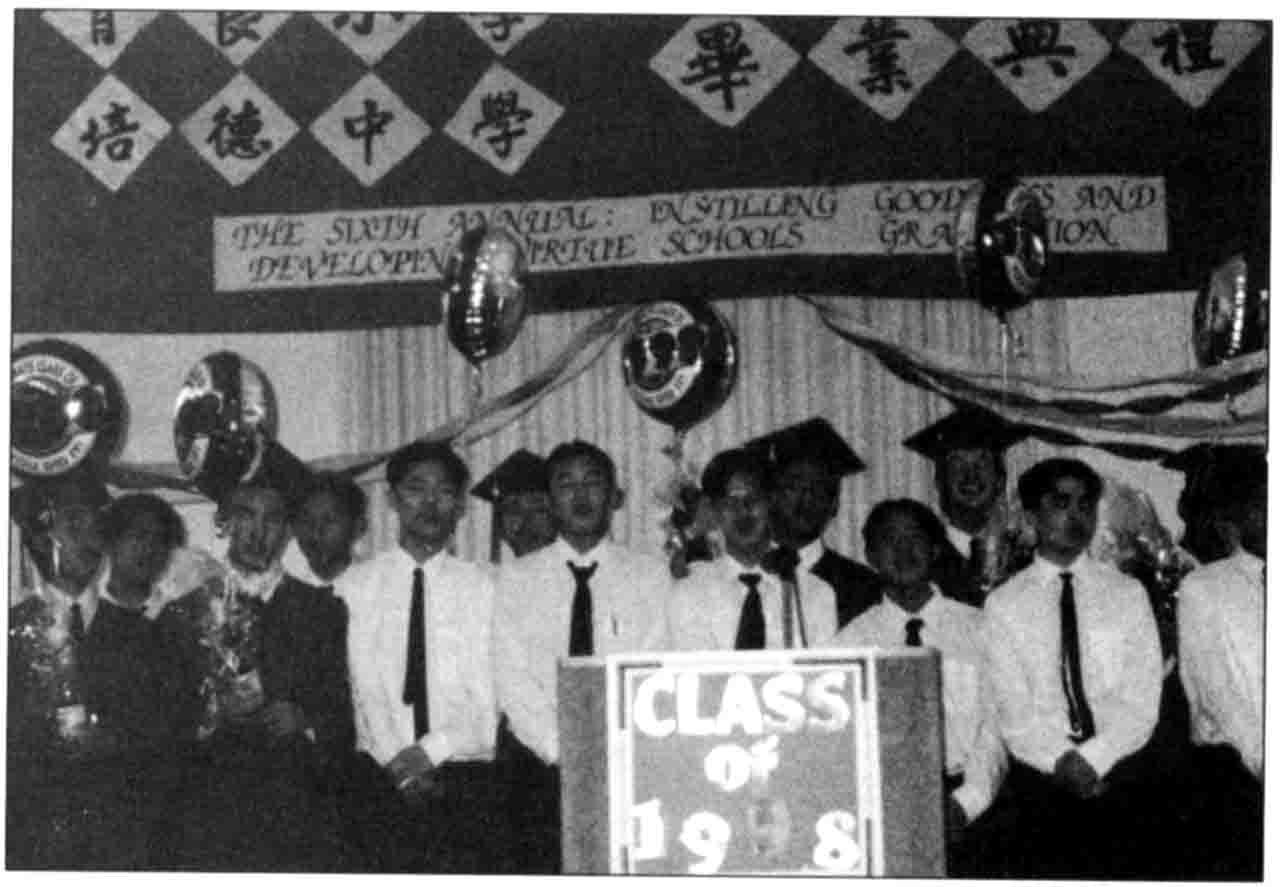|

曾有學生這麼問:「在不殺、不盜、不邪淫、不妄語和不飲酒這五戒裏頭,哪個戒最難守得住?」大多
數人認為不殺
最難,也很多人以為不犯盜戒最難;其實不妄語更難!為什麼呢?因為生活在世俗社會的一般人,總是對殺盜淫等大惡較有戒心,對飲酒吸毒也很警惕,唯獨輕忽了
妄語的要緊性,以為既不致損身害命,更無傷大雅;於是乎信口一句話或一個玩笑,就已經破妄語戒了!不過講話雖然要誠實,為了顧全大局或大信用,有時卻也不
得不說小謊;總之,是否信實,是以初發心那一念為憑的;醫生為怕病人失去求生意志而說他得的不是癌症,不算破戒。
古希臘有個大政治家撒士德塔兒。一天,他正在花園散步,忽然自外頭跳進一個滿身血污的青年。起先
他還以為是小
偷,可是那青年卻「撲通」一聲跪倒,急切地哀求他:「我因為和人打架,失手把對方打死,別人追著要我償命;不得已,我才跳進牆來躲,請您務必救我的命。」
青年一邊說,一邊哭著連連磕頭。撒士德塔兒看他太可憐,就答應救他這一次,把他帶到地窖藏起來。不料,過了一會兒,許多人抬了具死屍來,死者是撒士德塔兒
的兒子,他救的青年正是兇手。撒士德塔兒想了一下,表示不知情,就叫人把兒子屍體抬出去料理。到了夜晚,撒士德塔兒把青年自地窖帶出,交給他一匹黑馬,
說:「我本該把你交給那些人,因為你打死的正是我的兒子。但我已答應救你,不能不守信用。你趕快騎這匹馬逃走罷!」。
各位善知識!撒士德塔兒為守信用,不惜說小謊,救了殺子兇手;您或許認為他是個傻瓜,一點也不值
得這樣做吧?
但是,話說回來,死者既已無法復生,何必再賠上第二條命呢?能挽救一個悔過者的命,豈不等於是延續了自己兒子的生命?這樣於私情難捨能捨,於公信難守能
守,不是有非凡魄力的人,是做不到的;他之所以能成為一個非凡的政治家,不正因為他有這種不自私和堅守信用的非凡美德嗎?真正有德之士,做任何事都發乎肺
腑至誠,根本是連「值不值得」的那一念都沒有的。
因此中國古聖人以「仁義禮智信」為五常--五種必須奉行於日常的不變真理。曾子每日都拿三事做自
我的反省檢
討:為人謀而忠、與人交而信,學而時習之。孔子也說:人而無信,就像兩個車輪間沒了鎖住車轅的關鍵,車子還可以帶得動嗎?可見誠信對人的重要。記得世俗通
語有言:「害人之心不可有,防人之心不可無。」又說:「逢人但說三分話,不可全掏一片心。」其實,這只是一種老於世故的說辭罷了!說謊就像吸鴉片,是會上
癮的。人起初只是以不實的言語來保護自己,以為反正不傷害到人;殊不知習慣成自然,謊言就越說越順溜;到後來,無法自圓其說時,為圖掩飾,便開始惡意欺詐
了。就像攜帶槍械刃棒,雖說原是用來防身,最後總歸是把自己也傷害了;因為君不見死於刀槍下的人,都是挾帶武器的人?「善泳者溺」,也正是這個道理。須知
人心真能不設防,才是大防。
菜根譚上有言:「信人,示己之誠;疑人,顯己之詐。」何況事情都有其因果本末,今生若被騙,就因
前生騙過人;
要認、要懺悔,而不是在那兒怨天尤人,甚至圖謀報復,反而又累增了罪業。只要一心一意持守誠信,舊業既消,福德自來;你再怎樣天真直率,也不會被騙的。這
說起來很妙,也很不可思議;但是你若信根具足,不但不去懷疑這道理,還能拳拳服膺,你自然會逐漸體會、受用到這妙處的。所謂至德之人,自然而遵行;中根之
人,知利而勉行;下愚之人,疑善而不行。我們縱非至德,也不要做個下愚之人吧?
問:當聞佛法後,肯認真去學佛,然周遭的親友未能認識佛
法,認為太
迷,走火入魔。此時,當所謂慈悲、順俗、和光同塵呢?還是咬釘嚼鐵,刻骨銘心,自拔於生死苦海?請慈悲開示。
上人:你要能夠
做疾風中的硬燭,烈火內的精金,有百折不撓的精神,那才是佛的真正弟子。
|
|
Students have asked, “Among
the
five precepts of no killing, no stealing, no sexual misconduct, no
lying, and no taking intoxicants, which precept is the hardest to
uphold?” The great majority of people think not killing is the hardest;
many people also think not stealing is the hardest. Actually, not lying
is even more difficult! Why? Because while most people who live in this
society are relatively careful about avoiding major evils such as
killing, stealing, and sexual misconduct, and they are also pretty
cautious about drugs and alcohol, they overlook the importance of not
lying. Thinking that lying doesn't endanger anyone or cause any harm,
they carelessly blurt something out or crack a joke--and end up
breaking the precept against lying. However, while we should generally
tell the truth, sometimes the overall situation or the real meaning of
honesty requires us to tell a white lie. Honesty is judged by one's
underlying motivation. If a doctor, to keep a patient from losing the
will to live, tells him that what he has is not cancer, that is not
considered a violation of the precepts.
One day, a great political
leader
in ancient Greece was strolling in the garden, when suddenly a lad
covered with blood jumped in from outside. At first he thought it was a
burglar, but the lad knelt down before him and beseeched him, “I
accidentally killed someone in a fight. Now people are demanding my
life. I jumped over the wall to hide from them. Please save me.” Crying
as he spoke, the lad bowed down to the ground. Seeing what a pitiful
sight he was, the man promised to save him and hid him in the cellar. A
little later, some people carried in a corpse—it was the man's son. He
had saved his son's murderer. After thinking about it, he indicated
that he didn't know where the killer was and told the people to take
his son's corpse to be buried. When night fell, he took the lad out of
the cellar, gave him a black horse, and said, “I should have turned you
over to those people, because the one you killed was my son. But
because I'd promised to save you, I couldn't break my promise. Mount
this horse and flee quickly!”
Good and wise advisors! In
order
to keep his word, that Greek leader lied to save the killer of his own
son. You may consider him a fool for having acted that way. However,
since his son could not have been brought back to life, what would have
been the point of taking another life? Saving the life of a repentant
lad—isn't that equivalent to prolonging his own son's life? Being able
to relinquish personal affections and maintain trustworthiness with a
stranger is not something an ordinary man would be able to do. He was
such an extraordinary political leader precisely because of his
unselfishness and firm integrity. A truly virtuous person acts out of
wholehearted sincerity and never asks whether his deeds will bring him
any advantage or not.

Therefore the ancient sages
of
China considered humaneness, righteousness, propriety, wisdom, and
trustworthiness to be five constants—five invariable truths that must
be upheld in daily life. Zeng Zi examined himself on three points every
day: whether he faithfully conducted his business with others, whether
he was trustworthy in his friendships, and whether he reviewed what he
had learned. Confucius also said that an untrustworthy person is like
two wheels without the axle to lock them in place—how could they
support the cart? This shows the importance of honesty. I remember a
worldly proverb: “Never have a thought of harming others, but always be
on guard against being harmed by others.” Another saying goes, “When
you meet someone, speak just a little. Don't pour out your heart to
him.” Actually, these are just words of worldly experience. Lying is
like smoking opium—it's addictive. People initially use dishonest words
to protect themselves, thinking it won't hurt anyone; they never expect
that it will turn into a habit and they will become so good at telling
lies, till finally, to cover up for themselves, they start deceiving
people maliciously. It's like when people carry weapons for
self-defense, they end up getting hurt themselves. Haven't you noticed
that people whose death is caused by weapons are usually
weapon-carriers themselves? The same principle is found in the saying,
“Good swimmers often drown.” We ought to realize that having a totally
unsuspecting mind is the greatest defense.
The Vegetable Roots
Discourse
says, “When you trust others, it shows your own sincerity. When you
doubt others, it reveals your own deceptiveness.” How much more
is this the case when things are viewed in terms of causes and effects.
If you are cheated in this life, it's because you cheated others in a
previous life. You should bear it and be repentant, instead of
complaining, blaming others, or seeking revenge, for that would only
increase your offenses. As long as you singlemindedly maintain your
honesty, your old karma will be eradicated and blessings will naturally
come. No matter how naive and straightforward you are, no one will be
able to cheat you. This sounds pretty mysterious and inconceivable, but
if you have faith, not only will you not doubt it, you will fully
accept it and naturally and gradually come to understand and fathom the
mystery. The most virtuous people naturally follow this principle.
Average people know the benefit and try to follow it. Foolish people
doubt what is good and don't practice it. While we are not the most
virtuous people, we don't want to be fools either, do we?
Question: After hearing
the Buddhadharma, I wish
to
truly practice Buddhism. However, my friends don't understand Buddhism
and consider it to be superstitious and demonic. Should I maintain a
compassionate attitude and follow along with worldly ways, blending
into the crowd, or should I grit my teeth and stick resolutely to my
beliefs in order to pull myself out of the bitter sea of birth and
death? Kindly advise me.
Venerable
Master: You should
be a
brave candle in the strong wind, pure gold in the blazing fire. Don't
give up even if you encounter a hundred setbacks. Then you are a true
disciple of the Buddha.
|